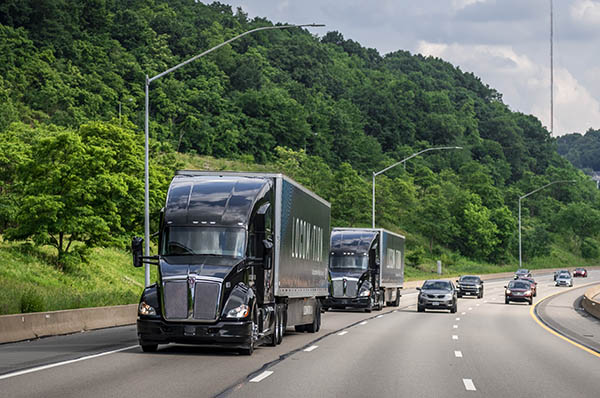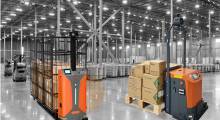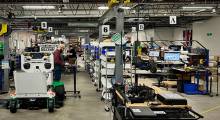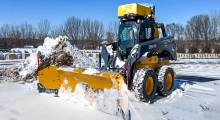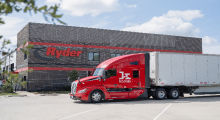As with other autonomous vehicles, self-driving trucks promise increased safety, economic value, and sustainability. The Autonomous Relay Convoy from Locomation could reduce the greenhouse gas emissions, fuel consumption, and operating costs of transporting goods by truck, according to an independent evaluation by Boundless Impact Research & Analytics Inc.
“Our environmental impact assessment of Locomation’s technology provided a science-based and independent critique and comparison of the environmental benefits of several trucking technologies,” said Bret Strogen, director of research at Boundless. “Locomation’s autonomous trucking system would offer a significant environmental improvement over other common fuel-reduction technologies such as cooperative adaptive cruise control and idle-reduction technology.”
Founded in 2018 by veterans of Carnegie Mellon University’s National Robotics Engineering Center (NREC), Locomation said it is developing autonomous vehicle products and tools to enable its clients “to implement an operating model designed for autonomous vehicles.” The Pittsburgh-based company's team includes experts in robotics, artificial intelligence, trucking, freight optimization, safety, and automotive technologies.
Locomation ARC to lengthen operations
Locomation’s Autonomous Relay Convoy (ARC) system consists of two-truck convoys that are electronically tethered. The Human-Guided Autonomy product enables one driver to operate the lead truck while a second driver rests in the follower truck, which is operating autonomously.
Periodically, the trucks swap places to allow each driver to take turns leading and resting in compliance with U.S. Department of Transportation (USDOT) hours-of-service regulations.
Locomation said it can enable carriers to safely operate two trucks for 20 to 22 hours per day, delivering double the cargo, faster, and at twice the distance.
“This model makes sense for a number of reasons,” said Finch Fulton, former deputy assistant secretary of policy at USDOT and vice president of policy and strategy at Locomation. “You might want Level 5 autonomy in all situations, but that may not be available until the end of the decade or later, and it's not affordable. There are also questions of how quickly frameworks for safety can be developed.”
“We're also thinking of the ongoing roles for drivers, who must still deal with inspections, law enforcement, and getting out of the vehicle to do something like put out a flare,” he told Robotics 24/7. Human drivers are still needed for safety, even as it is a major driver for autonomous truck development, Fulton added.
“Accidents related to commercial vehicles result in 5,000 to 6,000 fatalities per year in the U.S.,” he said. “The overall rate is about 36,000, with people driving drunk 10,000 of those, speeding another 10,000, and distracted or drowsy drivers 5,000, plus people not wearing seatbelts.”
Fulton recently joined the board of directors of the Partners for Automated Vehicle Education, a coalition of industry partners and nonprofit groups working to educate policymakers on the potential effects of autonomous vehicles.
Semi-autonomous freight has reduced footprint
Boundless analyzes technologies and companies for environmental impact based on a data-driven approach and life-cycle assessment (LCA) methodology. It said its derived scores and metrics are trustworthy and reliable because they are unbiased and validated by external industry and/or scientific experts. Boundless said it can perform rapid and screening LCAs; environmental assessments consistent with ISO 14040; and Scope 1, 2, 3 inventories.
The boundless evaluation of Locomation's technology found that, when compared with traditional Class 8 trucks, vehicles equipped with the ARC technology could do the following:
- Reduce the greenhouse gas (GHG) footprint of freight transportation by 22%
- Cut operating costs by 19%
- Decrease fuel consumption by 21%
- Lower photochemical ozone formation by 22%
- Reduce the GHG abatement cost, or dollars per tonne of avoided greenhouse gas emissions, below any of the alternatives considered
These conclusions are based on the ARC system’s ability to reduce truck idling by up to 90% and increase fuel efficiency by 8% on average, said Locomation.
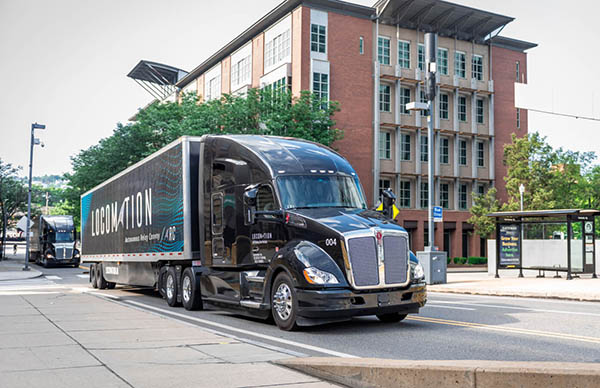
Boundless methodology
Boundless' environmental impact evaluation used an LCA method that assessed the Scope 1, 2, and 3 GHG emissions of Locomation’s ARC technology. LCAs are recognized as far more rigorous than other reporting methods, said the companies.
The analyst firm researched and modeled the material, energy, and performance characteristics for Locomation’s ARC system based on detailed information provided by Locomation that described the material components and energy consumption impacts, and labor, and cost implications.
At the core of the methodology is an LCA model for the transportation of goods by a long-haul Class 8 truck carrying 1 ton of goods for 1 kilometer (tkm) on a highway.
The Boundless Impact Score is a summary of the five environmental key performance indicators (EKPIs) listed above. Locomation scored best in each EKPI compared to the alternative technologies listed in the report. As a result, Boundless awarded Locomation its highest possible score for positive environmental impact, a 10 out of 10 on per-unit impact.
According to Boundless' evaluation, the ARC system was the most cost-effective means to reduce emissions and operating costs, and it does not require a price on carbon to be economically viable.
The full report is available for download from Locomation.
Locomation looks to scale up
“This report confirms that Locomation’s ARC system means dramatic efficiency gains, saving fuel and eliminating idling and empty miles, and can help carriers and shippers dramatically reduce their Scope 1 and Scope 3 greenhouse gas emissions.” said Dr. Çetin Meriçli, co-founder and CEO of Locomation. “We are proud to be the first company to verify its green claims with an independent, third-party, science-based review, and we invite anyone making claims around environmental impact or fuel consumption to do the same. ”
Locomation said its strategy and practices align with its supply chain partners’ sustainability goals by contributing to the UN’s Sustainable Development Goals related to health effects, innovation, sustainable production, and climate action.
Locomation said it is preparing to be the first autonomous trucking technology company to safely, legally, and routinely engage in commercial operations at scale in the U.S. with its ARC system, starting in late 2022 with Wilson Logistics and following with PGT Trucking in 2023.
“Our first major customer is Wilson, with 1,100 units,” Fulton said. “We're offering aftermarket equipment for autonomous convoy operations with a monthly subscription.”
About the Author
Follow Robotics 24/7 on Linkedin
Article topics
Email Sign Up

